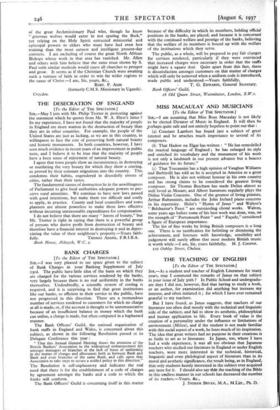THE DESECRATION OF ENGLAND [To the Editor of THE SPECTATOR.]
SIR,—May I join with Mr. Philip Trotter in protesting against the statement which he quotes from Mr. W. A. Hirst's letter ? In my experience, I have not found that the majority of people in England are more wanton in the destruction of beauty than they are in other countries. For example, the people of the United States are just as lacking, as we are in this country, in willingness to face the cost of preserving both natural beauty and historic monuments. In both countries, however, I have seen much evidence in recent years of an improvement in public taste, and I believe it to be true that the majority of people have a keen sense of enjoyment of natural beauty.
I agree that town people show an inconsistency, in destroying or mutilating the very beauty for which they show a craving, as proved by their constant migrations into the country. This condemns their habits, engendered in disorderly streets of cities, rather than their tastes.
The fundamental causes of destruction lie in the unwillingness of Parliament to give local authorities adequate powers to pre- serve rural amenities. We continue to have new laws passed with good intentions, but make them too difficult and costly to apply, in practice. County and local councillors and town planners are almost powerless to make these laws effective without incurring unreasonable expenditures for compensation.
I do not believe that there are many " haters of beauty," but Mr. Trotter is right in saying that there is a powerful group of persons who derive profit from destruction of beauty and therefore have a financial interest in destroying it and in depre- ciating the value of their neighbour's property.—Yours faith-






































 Previous page
Previous page